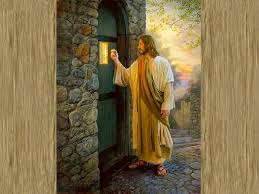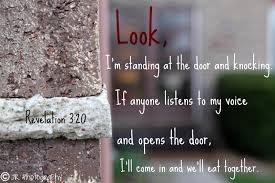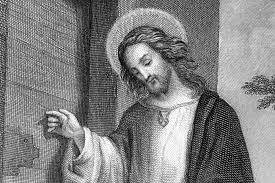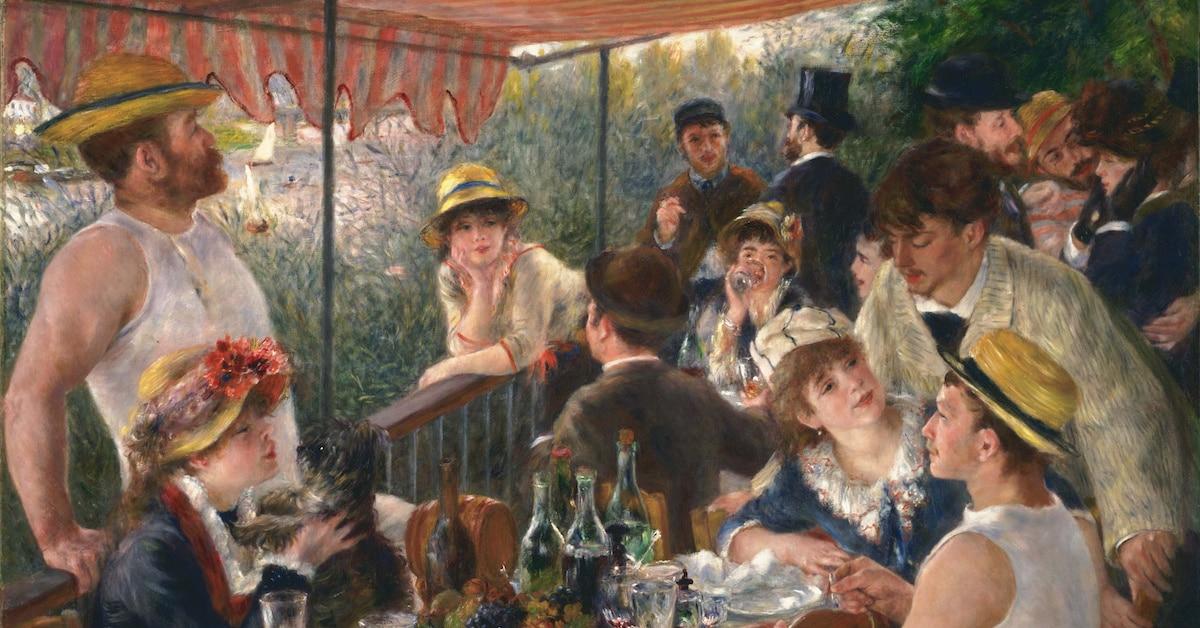I stand at the Door and Knock, Revelation 3:20
See! I stand at the door and knock. If anyone hears my voice and opens the door, I will come in to him and eat with him, and he with me.
-Revelation 3:20
-Revelation 3:20
I grew up seeing the picture of Jesus knocking and was taught that this was a beautiful picture applying to non-believers.

The context of this picture really is the church.
It is the door of the already saved believer that Jesus is knocking on.
Why is the door shut?
Why is Jesus outside the house of believers?
Why is he knocking and not just entering?
Why does Jesus even need the door?
Why is the door shut?
Why is Jesus outside the house of believers?
Why is he knocking and not just entering?
Why does Jesus even need the door?

The first word he says is, "Behold", or "Here I am", "Look", or, "See".
He is trying to get our attention.
Maybe we are distracted.
The context helps and the context is that he has just spoken a hard word to us, the people behind the door, who are believers, and his church.
He is trying to get our attention.
Maybe we are distracted.
The context helps and the context is that he has just spoken a hard word to us, the people behind the door, who are believers, and his church.

Yes, Jesus has a hard word oftentimes for his people.
He started his ministry with the message, "Repent!", and sent the Apostles out preaching repentance.
A gospel devoid of repentance is not the gospel!
"Come as you are, but I love you too much to let you stay that way."
"Come as you are, but I love you too much to let you stay that way."

Right after Jesus gives his corrective word, he asks to come in and eat and be together.
Again, why is the door not open?
And why does the Lord Jesus have to ask to be let in to the house of believers?
Someone shut the door.
Is it a coincidence, or is it shut deliberately?
Again, why is the door not open?
And why does the Lord Jesus have to ask to be let in to the house of believers?
Someone shut the door.
Is it a coincidence, or is it shut deliberately?

God is love and God is compassionate.
God is kindness.
But these are not the Gospel.
The Gospel is that we messed up and need fixing.
God does love us, but we can't get to him without help.
We need to change and be changed.
We need to die and we need his death, in order to live.
God is kindness.
But these are not the Gospel.
The Gospel is that we messed up and need fixing.
God does love us, but we can't get to him without help.
We need to change and be changed.
We need to die and we need his death, in order to live.

It is kind of obvious that Jesus is knocking on the door because we have shut him out.
And we can only deduce that it is because he gave us a hard word.
But look, see him, hear him.
And we can only deduce that it is because he gave us a hard word.
But look, see him, hear him.
He is at our door and he tells us that he wants to come in and eat with us and us with him.
Hear.
Hear.

NT Wright (Revelation For Everyone)
Saint Teresa of Avila once complained to the Lord about what she was suffering. 'This', he is said to have replied, 'is how I treat my friends.' Teresa, who by then prayed in the good, direct, and biblical style, retorted,
Saint Teresa of Avila once complained to the Lord about what she was suffering. 'This', he is said to have replied, 'is how I treat my friends.' Teresa, who by then prayed in the good, direct, and biblical style, retorted,

'Then you shouldn't be surprised that you have so few of them.' Verse 19 has just the suggestion of that kind of wry humour: after the withering denunciations of verses 15-18, Jesus now says, in effect, 'Now you know how I treat my friends!'

It is because the Laodicean Christians are still, despite everything, on Jesus' list of friends - and Jesus is a faithful friend, even if we are not - that he will tell then sharply and truly when they are in the wrong. Because he is not only a friend but their Lord,

he will also punish them, not to devastate them but to bring them to their senses. 'Stir up your spirits and repent!' One might say to many parts of today's church: if the cap fits, wear it.

The letter to Laodicea carries the most striking descriptions of Jesus himself, and the most powerful promise. Strange, perhaps, that the one church that was in real trouble drew from the Lord the most intimate and loving promise.

The echoes of the stories in the gospels suggest that the one knocking on the door is the master of the house, returning at an unexpected hour as in the warning to Sardis (in Rev. 3:3), while the one who would open the door is the servant who has stayed awake.

It is then, Jesus' house in the first place; our job is to simply welcome him home.
...'I will come in to them and eat with them, and they with me.' No early Christian could have heard these words without thinking of the regular meal, the bread-breaking,
...'I will come in to them and eat with them, and they with me.' No early Christian could have heard these words without thinking of the regular meal, the bread-breaking,

at which Jesus would come powerfully and personally and give himself to his people. Such meals anticipate the final messianic banquet (see Rev. 19:9). They are advance 'comings' of the one who will one day come fully and for ever.
(NT Wright, Revelation for Everyone)
(NT Wright, Revelation for Everyone)

Comments
Post a Comment